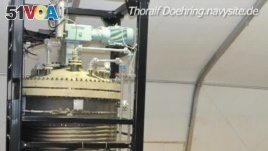December 12,2013
PENTAGON — The U.S. Defense Department is preparing to test a system it plans to use to destroy Syria's chemical weapons stockpiles at sea. Officials are offering reassurances that the process will be safe.

With civil war raging, destroying the weapons inside Syria is not an option.
So the U.S. is drawing from decades of experience in destroying its own stockpiles and is offering to put that knowledge to work aboard the ship, the Cape Ray, where equipment is being loaded to neutralize Syria's sarin and mustard gas at sea.
"We've destroyed more than 90 percent of our stockpile of chemical weapons from the Cold War era here in the United States, and we continue to do that work in a couple of sites in the United States, including the same technology that we plan to use on the craft to destroy Syria's chemical weapons," said Jennifer Elzea, a Defense Department spokeswoman.
The process involves neutralizing the chemicals by mixing them with water and other substances. The U.S. decided to do the process at sea when it became clear that paperwork and compliance with environmental and safety regulations on land would mean missing disposal deadlines.
Daryl Kimball heads the Arms Control Association, which advocates against weapons of mass destruction.
“One of the reasons they're pursuing this sea-based option is that the aggressive schedule for the removal and the destruction of the chemical weapons makes it difficult for any country to take on this task," he said.
Officials say the process - though never tried aboard a ship - is safe. They say the decision to neutralize the chemicals at sea is not an attempt to circumvent any country's environmental regulations.
Where the waste from the operation will be processed remains a question. U.N. officials are examining bids from more than 40 companies in various industrialized countries.
Paul Walker of the Green Cross environmental group says neutralizing the weapons at sea is a good idea. But he's calling for careful disposal.
"If we treat this toxic waste, it should be treated in an obviously very, very good way, but in full protection of environment and public health so that no one is really injured or even perceives that they may be being injured," he said.
Pentagon officials say once the stockpiles are neutralized, the waste will be taken to a commercial disposal facility on land and processed the same way other hazardous material is.
“This low level effluent will be stored on the ship. Nothing will be going into the ocean during this process," said Pentagon spokeswoman Elzea.
U.N. inspectors have identified at least 20 tons of mustard gas and more than a thousand tons of materials used to make sarin and other weapons that Syrian forces used to kill more than a thousand civilians earlier this year.
Under a deal that followed threats of U.S. military action against the Syrian government, all chemical weapons must be removed from the country by December 31.